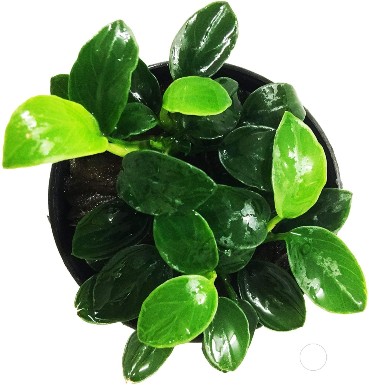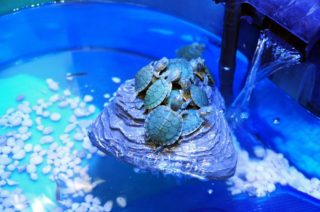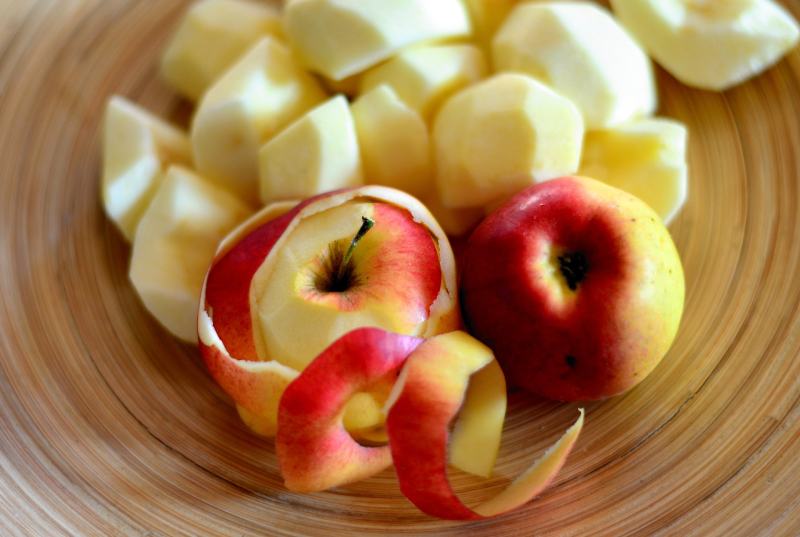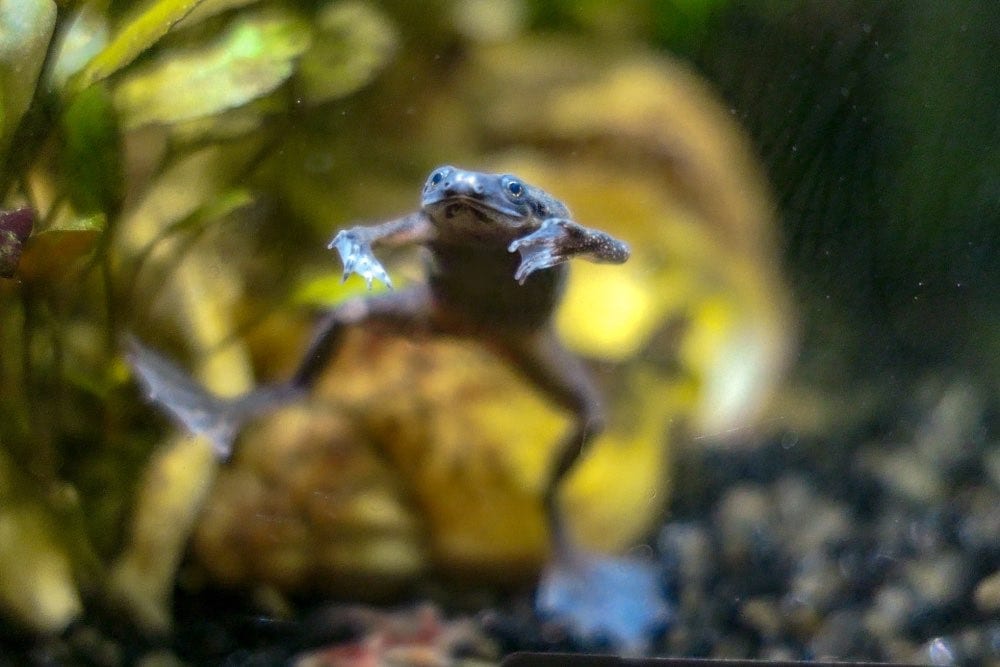New Goldfish Supply List 2024: All the Gear & Essentials

Updated on
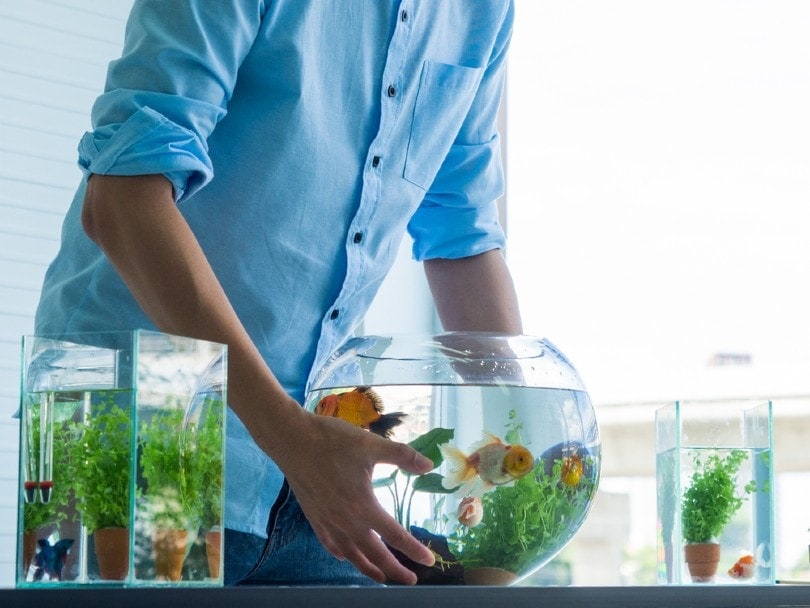
When it comes to keeping goldfish, it’s important to be prepared before bringing any fish home. Knowing which supplies will benefit you the most in your fishkeeping venture will help ensure you keep your fish happy and healthy, providing them with the longevity that these fish experience with proper care.
It can be overwhelming when trying to determine what you need, though. You may have found yourself lost among the multiple aquarium supply aisles at your local pet store. You may have even had someone with a sales quota to meet attempting to tell you what you need without any real consideration for your fish’s long-term needs.
To make this less complicated and confusing for you, we’ve put together a comprehensive list of everything you need to get started in the world of goldfish keeping.
Care & Maintenance
Bringing home the right care and maintenance supplies can not only get you off on the right foot but make your life easier in the long run, on top of making the lives of your goldfish healthier.
Happy, healthy fish for life!
1. Tank Care Supplies
These items will ensure you have the best tank cleaning experience every single time. While cleaning your goldfish tank can’t be expected to be a fun project, these products can make it faster, easier, and safer for you and your fish.
2. Python Aquarium Siphon
For large aquariums, this siphon makes life infinitely easier. Hauling buckets is a pain in more ways than one. I know because I used to do that EVERY WEEK. Talk about back strain! My life is so much better with the Python. If your tank is over 20 gallons, this is a must. I even use it for aquariums as small as 10 gallons. Once you use it, you will never turn back. It comes in several hose lengths:
3. Python Pro-Clean
This nifty hand-held siphon is ideal for small partial water changes. It gently lifts debris from the bottom of the tank and does not suck up Caribsea sand. It comes in various sizes depending on the volume of your tank:
 Food and Feeding Supplies
Food and Feeding Supplies
One of the simplest ways to ensure health and longevity for your goldfish is by feeding them high-quality fish food. Gone are the days when we pick up the cheapest flakes at the local grocery store! High-quality fish food can not only enhance the health of your fish but also improve their appearance by stimulating growth and healthier color production.
4. Automatic Fish Feeder
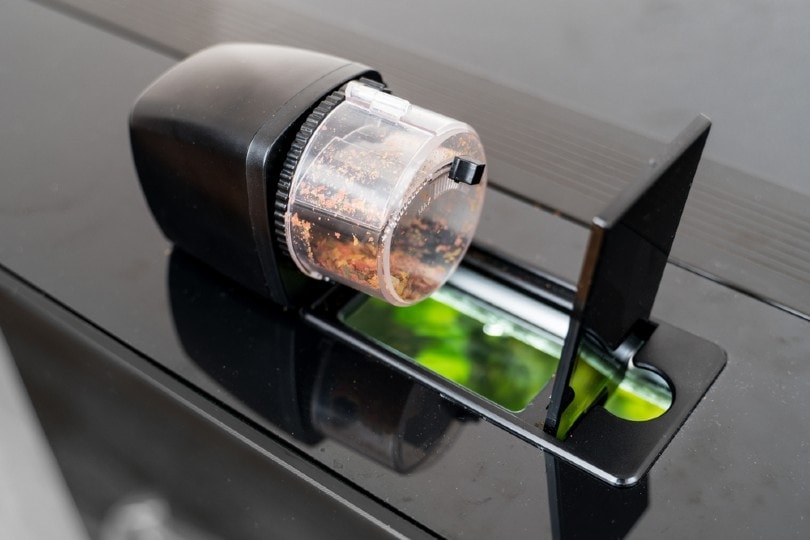
An automatic feeder is great for those of us with busy schedules. It’s ideal for feeding pellets to your goldfish!
5. Gel Food
I’ve tried feeding my fish many types of food over the years, and the winner has to be gel food. Dry foods are just not as easy on the goldfish’s digestive system (which is intended to eat wet food). Out of all of the gel foods available on the market today, I’ve found Repashy Super Gold to be superior in every respect and prefer it to all of the other brands for my goldfish as their diet staple.
6. Omega One Pellets
Finding good quality, affordable food can be difficult. Omega One is used by large goldfish breeders (and myself) for fancy and slim-bodied fish alike. The small amount of starches and a higher ratio of seafood protein helps ensure greater digestibility than lower quality regular brands.
7. Azayaka Pellet Food
High-quality pellet food is very difficult to find. Most brands, even the ones marketed as high quality, contain large amounts of wheat flour, corn, soy, and other ingredients (which are actually just fillers) goldfish can’t digest. Good digestion is essential to preventing problems such as swim bladder disease prevalent in fancy goldfish. That’s why I only use Azayaka pellets for my goldfish. It comes in several formulas depending on the age of your fish:
- Fish over 1 year – basic formula
- 3-12 months old – growth formula
- Baby fish – fry formula
8. Veggie Clip
I’ve found the suction cups on the cheaper models lose their grip after just a short time. The nifty magnet on this good-quality one means you don’t have to put your hands in the water each time you get it out, and it never stops working.
9. Digital Waterproof Thermometer
Using an instant-read thermometer to make sure your tap water is the same as your tank water is something I recommend doing for your fish during water changes (you’d be shocked at how much more accurate it is than using your hand). If you’re like me, you probably think, “ah, I’d never drop it in the water.” Boy, was I wrong! I’ve burned through three thermometers and was so glad when I found the waterproof kind.
10. Glass Algae Scraper
This algae scraper is perfect for cleaning the glass down on a weekly basis. It floats, making it easy to retrieve.
11. Acrylic Algae Scraper
This is the acrylic version of the floating algae scraper. It is designed in such a way as to prevent scratches on the acrylic surface.
12. Earthworms
Live foods that have a strong amino acid profile and are low in pathogens are probably the BEST food you can feed your goldfish. I buy my organic live earthworms online and keep them in a mini compost bin (plastic shoebox) with some dirt and kitchen scraps so I can feed them any time to my fish… and boy, do they love them!
 Water Care Supplies
Water Care Supplies
It’s important to understand the specifics of providing good, clean water to your goldfish. If you’re just dumping in straight tap water with every water change, you may be doing more harm than good. By using water care products, you can make the water healthier and safer for your fish, as well as enhance the beauty of your tank.
13. Auro Liquid Gold
Remineralize your water and remove nasty toxins for healthier, longer-lived fish. Auro Liquid Gold is the only complete solution I’ve found to take out fluoride, heavy metals, pharmaceuticals, and more, helping to prevent tumor problems.
14. Prime Water Conditioner
Most tap water contains toxic ammonia before you ever even put it in the tank, which is why it is important to remove it first. Seachem Prime can also be used to lock down ammonia and nitrite if there is ever an emergency spike during cycling.
If you have a large tank or pond, I recommend getting the gallon size here to save on costs per ounce.
15. ATM Paradigm
Paradigm is a vitamin C-based dechlorinator. Since it’s all-natural, you know what you are putting in your water is truly good for your fish, unlike other products which utilize questionable chemicals. It has immune system boosting and chlorine/chloramine removing benefits all in one and is also fantastic for aquaponics.
16. Probiotic Biological Cleaner
Harness the power of bacteria to make your life easier and your fish healthier. StressZyme supports a cleaner aquarium by providing six strains of probiotics directly into your water.
17. Probiotic Bacteria Supplement
Over time, the typical aquarium will get out of balance as disease-causing bacteria multiply. Dr. Tim’s Eco-Balance helps keep them in check.
18. Crushed Coral
Is your pH low out of the tap? Are your KH and GH levels too low? Crushed coral to the rescue! Crushed coral helps to buffer your water, stabilizing your pH to be between 7–8. Use 1/2 C per 20 gallons.
 Water Testing Supplies
Water Testing Supplies
Water testing supplies are an essential part of fishkeeping that is often overlooked. These supplies allow you to check your water for dangerous levels of waste and chemical buildup that can harm or kill your fish, plants, and other living things in your aquarium. Make sure to thoroughly read the instructions on any supplies before use to ensure you’re using them properly.
19. Strip Water Test Kit
A water testing kit is something every fish keeper should never be without. I like test strips because they are more environmentally friendly, faster to use, and the reading variation is minimal between liquid kits.
Ammonia, nitrite, nitrate, and pH are all the fundamentals. I also recommend knowing your KH & GH levels as well. This kit contains nitrite, nitrate, pH, KH, and GH. You will need a separate kit for ammonia and copper.
20. Liquid Water Test Kit
The API freshwater master test kit gives you comprehensive readings for ammonia, nitrite, nitrate, and pH. You will need to test GH and KH separately with their other kit.
21. Ammonia & PH Alerts
I love my Seachem ammonia & pH alert tabs. Testing for pH daily is important, but with liquid or even strips, it can be a pain; this makes one quick glance sufficient.
22. TDS Meter
Knowing your water’s TDS using a TDS Meter can help keep your fish healthy and your plants properly nourished. It’s especially useful for aquariums that don’t get many water changes.
23. Water Heater
Fancy goldfish do best in warmer water temperatures. Heaters keep the water temperature constantly stable and comfortable and are especially useful in the wintertime. I’m picky about my heaters because I don’t want any electric current leaching into the water and stressing my fish.
I’ve also had issues in the past with some heaters giving out after just a little bit of use. After testing several brands, the winner is Aqueon. It’s shatterproof in case you ever forget to unplug during a water change, which can happen to the best of us. The temperature also matches the thermometer readings, which is useful. How many Watts you need depends on the size of your tank.
If you're new to the world of goldfish or are an experienced goldfish keeper that loves to learn more, we recommend you check out our best-selling book, The Truth About Goldfish, on Amazon. From diagnosing illnesses and providing correct treatments to ensuring your goldies are happy with their setup and your maintenance, this book brings our blog to life in color and will help you to be the best goldfishkeeper you can be.
The Medicine Cabinet
I always recommend keeping these on hand for quarantine or if an issue ever comes up. Sometimes, no matter how well prepared you are, your fish might get sick, or your tank cycle might crash. These products can help you be fully prepared for the unexpected. Problems with an aquarium can happen to the most experienced fish keepers!
24. Microscope
I highly recommend having a microscope if you are going to keep goldfish. It is the only reliable way to determine which parasite might be contaminating your fish. Then, you can choose the right treatment before it is too late. I use this one because it goes up to the highest power you need to see the common parasites of goldfish while being affordable and easy to use. You’ll need some glass slides to use it.
25. Aquarium Salt
In my opinion, salt is a must in every fish cabinet. It combats a variety of parasites and acts as a tonic in healing for goldfish. It’s the best ich treatment, in my opinion.
26. Himalayan Pink Salt
Himalayan salt offers the healing benefits of essential trace minerals lacking in regular salt. Excellent for helping boost your fish’s recovery.
27. MinnFinn Disease Treatment
MinnFinn is the safest treatment for flukes, most of the common external parasites, and external bacterial or fungal issues. Use for fish in quarantine or fish that have recently come down with flukes, costia, chilodonela, trichodina, columnaris, fungus, mouth rot, or bacterial gill disease.
It can also help deal a blow to anchor worms, fish lice, and ich in their free-swimming or egg stages. I always, always keep a bottle on hand. It also comes in a more cost-effective large size for bigger tanks (30 gallons +) or ponds.
28. Wild Oregano Oil
It’s one of nature’s strongest antibiotics. Wild Oregano Oil taken orally by the fish can help with internal bacterial infections such as popeye, dropsy, and septicemia. This brand is pre-diluted, so you can simply coat the pellets and feed them to your fish.
29. Melafix
As a great remedy for gram-positive bacterial infections, Melafix is a gentle remedy for issues like fin rot, bacterial gill disease, mouth rot, and more. You can make your own using cajeput oil and the recipe in The Truth About Goldfish book.
30. Organic Aloe Vera Gel
Aloe vera is a natural way to repair tissue and is great for fish that have recently been stressed. You can also use organic aloe vera gel to help mix up homemade Melafix & Pimafix recipes.
31. Cajeput Oil
Save money by making your own Melafix at home with cajeput oil! You can also substitute Tea Tree Oil if you want.
32. Tea Tree Oil
You can use tea tree oil instead of cajeput oil by purchasing it here.
33. Pimafix
With an active ingredient of West Indian Bay Leaf oil, Pimafix primarily targets fungal infections in fish. It can also help with controlling some bacterial infections. You can make your own Pimafix with West Indian Bay Leaf oil as a cost-effective, chemical-free alternative.
34. West Indian Bay Leaf Oil
Save money by making your own Pimafix using all-natural ingredients. You will need West Indian Bay Leaf essential oil to do so.
35. Microbe-Lift Artemiss
When Melafix doesn’t help, Microbe-Lift Artemiss can come to the rescue. It’s an all-natural treatment that can help fight bacterial infections with fish by providing extra immune support. It can be used alone or in combination with 0.3% salt and alternated with Microbe-Lift Herbtana to combat parasitic and bacterial infections.
36. Microbe-Lift Herbtana
Microbe-Lift Herbtana can help boost the immune system of fish that are dealing with a parasitic infection. It’s an all-natural way to help your sick fish.
37. Chlorophyll (Liquid)
Chlorophyll is a wonderful tonic for goldfish. I use this organic brand for making chlorophyll baths for my fish. It’s excellent for boosting the immune system or as an antidote to nitrate poisoning.
38. Colloidal Silver
One of my favorite remedies for bacterial and fungal infections is a natural antibiotic – colloidal silver. It also has wonderful antiviral properties. Be sure to dilute it to 10ppm prior to use following the directions in The Truth About Goldfish book.
39. Vitamin C
Liquid vitamin C offers benefits for the immune system of fish. This formula can be used in fresh or saltwater and is pre-buffered, so it won’t alter your pH.
40. KoiZyme
KoiZyme is a biological formula of naturally occurring bacteria, enzymes, and micronutrients. It contains no chemicals, no medications, and no antibiotics of any kind, but it can prevent Aeromonas (a common cause of ulcer disease), Pseudomonas, and other pathogenic bacterial infections by out-competing the bad bacteria for food, resulting in reduced bad bacteria count in the water as they starve to death.
It is excellent as a preventative during times of stress for goldfish, such as right after shipping or a period of cold temperatures to prevent secondary infections. It’s safe to use with salt.
41. Hunza Apricot Kernels
They’re fed orally with food, and raw apricot kernels (high in vitamin B17) can be an effective method for ridding the fish of tumors.
42. Epsom Salt
The use of Epsom salt is primarily to help draw fluids out of the body when the fish is afflicted with swelling (popeye or dropsy). It is also wonderful for making an internal parasite-cleansing food.
43. 3% Hydrogen Peroxide
As a great topical disinfectant for ulcers and an excellent sterilizer for tanks and equipment, Hydrogen peroxide is something to always have on hand. You can even use it to remove black mold inside your silicone hosing.
44. Microbe-Lift Lice & Anchor Worm
Fish lice and anchor worms can be a big pain to deal with. Cyromazine (the active ingredient in Microbe-Lift Lice & Anchor Worm) is an effective remover of these pathogens.
45. Copper
This is a must-have for treating Velvet. Seachem Cupramine is the best version of copper for goldfish, and it can also be effective at killing ich. Be sure you remove your live plants or any snails you might have before use.
46. Oil of Cloves
100% oil of cloves is used for the peaceful euthanasia of fish.
47. Paraguard
Seachem Paraguard can be used against some minor parasitic outbreaks (I personally prefer MinnFinn for those). It can also help with treating lymphocytic lumps due to its antiviral properties. It does linger in fish tissues for a considerable amount of time.
48. Kanaplex
Seachem Kanaplex is an antibiotic that targets bacterial dropsy and several other bacterial and fungal-related diseases. I recommend keeping some on hand for emergencies.
49. Metroplex + Focus
Seachem Metroplex can be combined with Focus to make a medicated feed. It is primarily used for outbreaks of Hexamita, but can also be used to target internal parasites or ich (though I find salt the most effective treatment for that).
50. Sulfaplex
This is one of the gentler commercial antibiotics on the market. Seachem Sulfaplex can be helpful when dealing with certain cases of mouth rot or other bacterial or fungal issues.
51. Neoplex
Neoplex is an effective broad-spectrum antibiotic that is excellent for dealing with fin rot infections.
52. Furan 2
Furan 2 is a broad-spectrum antibiotic used to treat aggressive or advanced gram-positive or gram-negative bacterial infections.
53. E.M. Erythromycin
Since it’s typically used for treating gram-positive bacterial infections, E.M. Erythromycin can be useful for fish that are teetering on the edge.
Tank Setup
Get off to a great start with the right tank setup. There are a huge number of aquariums on the market today, and it can be difficult knowing which one to choose. Do you want acrylic or glass? Do you want something tall or long? These are our favorite tanks and tank setup products to get you up and running.
54. SeaClear Acrylic Aquarium
I can’t say enough good things about SeaClear’s line of acrylic tanks. I have two, and I absolutely love them. The lack of a black trim really lets you focus on what is in the tank and opens up the room. It comes in a variety of sizes for any hobbyist’s needs:
55. Aquarium Stand
I really like Caitec’s line of double aquarium stands. They’re easy to set up (it took me less than 5 minutes, unlike the first stand I tried), can hold 2 aquariums (if you want), and are reversible. The minimal aesthetic works well in just about any setting. I decided to paint mine white and couldn’t be happier with the final result. If you use an acrylic tank, just be sure to put a piece of wood between it and the stand.
56. Liquid Ammonia
Using pre-measured, fish-safe ammonia can be a very nifty way to cycle your tank in preparation for getting new fish. You can use it alone or with a beneficial bacteria supplement for faster results.
57. ATM Colony for New Tanks
There are several beneficial bacteria startup colonies on the market, and not all of them are created equal. ATM Colony is held to be the best by a number of fish experts. If you didn’t cycle your tank before you added fish, you can use this supplement to prevent dangerous ammonia and nitrite spikes and get your tank established faster.
Filters
Filters and appropriate filter media are absolute necessities when it comes to keeping goldfish. Goldfish are heavy bioload producers, which means they add a lot of waste to their environment for their size. A filter that can stand up to your goldfish’s bioload is the best way to establish and maintain a safe and clean aquarium.
58. Wet/Dry Trickle Filter
My go-to filter type of choice for goldfish is the trickle filter. If you want to save countless time and money doing water changes, effective nitrate removal is accomplished with this.
- For tanks up to 19 inches long, get 9 boxes
- For tanks up to 25 inches long, get 12 boxes
- For tanks up to 32 inches long, get 15 boxes
- For tanks up to 38 inches long, get 18 boxes
59. Aquarium Water Pump
This is ideal for 29-40 gallon aquariums, but a trickle filter needs a submersible pump to operate.
- 320-400 GPH (for tanks up to 40 gallons, 1.8-2.2 feet rated filter)
- 550-800 GPH (for 55-70 gallon tanks, 2.8-3.5 feet rated filter)
- 740-1100 GPH (for 75-100 gallon tanks, 42-45 inch rated filter)
60. Hang on Back (HOB) Filter
The Fluval C Power Filter is the only filter I’ve been able to find that overcomes the two major problems with hang-on back filters: lack of media exposure to oxygen and too much current for fancy goldfish breeds. It contains a wet/dry trickle chamber (which makes Fluval C the first of its kind in that regard) and a refiltration system that allows you to turn down the current without affecting the efficiency of the filter (a prefilter can also be added).
As an added bonus, it is quieter than many competing products. This makes the Fluval C HOB filter the one that I recommend for goldfish. It comes in 3 sizes depending on your aquarium volume:
61. Canister Filter
Canisters have the advantage of being quiet and can house a lot of media. They are often the choice of hobbyists who have a larger tank. This one by Penn Plax gives you everything a canister filter should while remaining affordable. A big plus is the flow rate shutoff valves, so cleaning is easier.
62. Sponge Filter
Sponge filters really help with clearing the water and provide mechanical filtration. I have had mine for 2 years, and it has not fallen apart in the least. It is great for tanks up to 75 gallons.
63. Undergravel Filter
The Undergravel filter can provide a good filtration option for goldfish tanks. It comes in different sizes, depending on your aquarium volume:
64. Reversible Flow Submersible Powerhead
Marineland’s powerhead offers the ability to easily reverse the flow for your Undergravel filter. You can also attach their prefilter to it to prevent waste from entering your filter bed. Simply connect the pump outlet tube to your riser tube with a reverse flow and enjoy a safer and more effective aquarium filter.
65. Seachem Matrix Filter Media
Filter media that actually takes away nitrates? Can it be? Seachem’s Matrix does just that and more. This is a small-size filter media. You may want to put it in a bag first. Please note that it can take 4–6 months for nitrate reduction to occur when using porous filter media.
66. Pond Matrix
Pond Matrix is a large version of the Seachem Matrix. It is fantastic for a variety of applications, including a substrate for undergravel filtration (let it soak first; the rocks will initially float) or in wet or wet/dry filters. It can help to reduce nitrates. Please note that it can take 4–6 months for nitrate reduction to occur when using porous filter media.
67. Filterplus
Filterplus is basically pumice stone, the perfect porous filter media for good anaerobic bacteria to live in with EXTREME surface area. It comes in the perfect size for goldfish—not too small to choke on if you put it in the bottom of the tank and perfect for many filters.
I use it in my wet/dry filter. I love the grey and white colors. Please note that it can take 4–6 months for nitrate reduction to occur when using porous filter media.
68. Marinepure Ceramic Biomedia
This golf ball sized media offers a deep core for good anaerobic bacteria to make their homes, where they will function as nitrate reducers. It provides a MASSIVE surface area for your colony, resulting in better filter performance for your fish. Best of all, it won’t easily clog with debris. It’s ideal for a wet/dry, sump or canister filter. Please note that it can take 4–6 months for nitrate reduction to occur when using porous filter media.
69. Hydroton
Hydroton (made of expanded clay) has an excellent surface area and porous core perfect for maximum filtration capacity, especially useful for Undergravel filters. Its size and shape is a much safer alternative to gravel to prevent choking. Be sure to rinse the dust off before using. Please note that it can take 4-6 months for nitrate reduction to occur when using porous filter media.
 Aquarium Accessories
Aquarium Accessories
Make your tank a beautiful environment for your fish to live in.Tank décor is rarely a necessity, but it can help you take a store-bought aquarium and make it unique. From a variety of goldfish-safe substrates to bubble walls and more, here are our favorite things you can add to your tank to beautify it and make it unique.
70. Full-Spectrum LED Light
Full-spectrum lighting is important to goldfish and plant health. And, of course, having the lights on lends such a special effect to the tank. I recommend keeping a full-spectrum light on your tank if it doesn’t get much direct sunlight for 8 hours a day.
71. Caribsea Super Naturals Aquarium Sand
I never liked sand in my tank until I tried Caribsea’s amazing sand. It is heavy enough that it doesn’t pull so easily into the siphon while allowing debris to sit on top. It comes in several beautiful colors (the crystal river is gorgeous and does not cloud the water at all, and the black moon sand is especially nice). Hint: to easily and naturally remove the initial cloudiness from Caribsea sand, just run a sponge filter for 8 hours and periodically squeeze it out.
You can do a lot of fun stuff with sand; in one tank, I have 1/4 to 1/inches of sand completely covering the bottom. On the other, I keep it semi-bare-bottom with part sand and part bare-bottom. The bare-bottom part looks like water near the bank. The goldfish can have their natural foraging behavior while cleaning is a breeze.
72. Seachem Flourite Black Sand
Flourite Black Sand is made of fractured volcanic clay. It never compacts and never needs replacing. It’s ideal for planted tanks, and I’ve found a sufficient depth (1.5″ min) helps promote nitrate reduction, possibly due to the superior surface area to that of regular sand.
73. Bubble Wall
There’s nothing like a sparkling bubble wall lining the back of your aquarium! Looks great with a light positioned above it.
74. Frosted Window Film
A tank backed with frosted window film has a lovely effect. This is what professional aquascapers use—you can even position lights behind it for a special color or lighting effects.
Plants
Plants are often underestimated in the aquarium hobby, especially by beginners. However, they shouldn’t be! Plants are capable of improving the appearance of your tank, as well as removing toxins and improving your aquarium’s water quality. They can also make life more interesting and fun for your curious goldfish.
75. Pothos
I love my queen pothos. This plant has beautiful dappled leaves and really adds a nice touch to the tank. Be sure to wash the roots completely free of dirt if you are going to place it directly in the water. You can also get golden pothos if you prefer more green on the plant.
76. Large Anubias Barteri
The large Anubias Barteri is a big, beautiful plant perfect to go in the background. This plant is grown in a digitally controlled nursery to guarantee a disease and snail-free plant.
77. Large Anubias Congensis
The large Anubias congensis has tall, narrow leaves. It is excellent as a background plant surrounded by broader-leafed mid-ground plants.
78. Medium Anubias Barteri
This species works great as a mid-ground plant. The medium Anubias Barteri can even grow little flowers. Grown it in a disease and pest-free environment to keep your tank safe.
79. Petite Anubias
Add some layering to your aquarium. Anubias nana petite is an excellent foreground plant that can be attached to rocks or wood. This plant is guaranteed to be disease and snail-free.
80. Java Fern
An unappetizing, low-light plant, Java Fern can make a lovely addition to your tank. It grows best with the roots not planted in a substrate but anchored to wood or rock.
81. Plant (Flourish) Glue
Planted tanks are amazing. Trying to figure out how to secure my plants has not been. Then I found plant glue, made by Seachem, makers of Prime. No more aggravation! It is a fish-friendly alternative to superglue and works in seconds. I got so tired of using string, which was definitely causing problems when it would come loose, and my fish would get caught in it.
82. Sea 90 Fertilizer
100% natural, fish-safe plant fertilizer Sea 90 helps supply essential micronutrients to prevent deficiencies.
83. Fish School Training Kit
It doesn’t take long to keep goldfish before you realize just how smart these little creatures are. Why not train your goldfish how to do tricks with a training kit? It provides great stimulation for your pet – and fun for you!
Reading Materials
Broaden your goldfish knowledge with these books. Reading materials are a great way to enhance your knowledge and stay up-to-date with the current knowledge base regarding the care of goldfish and improving and enhancing longevity and health.
84. Fancy Goldfish: Complete Guide to Care and Collecting
I highly recommend Dr. Erik Johnson’s book on goldfish. It’s a great addition to your library and contains lots of valuable information.
85. Fish Disease: Diagnosis and Treatment
This in-depth book covers fish disease from start to finish by aquatic veterinarian Dr. Edward Noga. It’s an excellent resource for learning how to diagnose and treat commonly encountered fish diseases.
86. Goldfish Breeding & Genetics
A must for the goldfish breeder!
87. Kingyo: The Artistry of Japanese Goldfish
If you are simply crazy about goldfish, you’ll love this illustrated book.
88. Chinese Goldfish
For traditional methods of raising goldfish in a low-tech environment, this book can give you the info you need.
Conclusion
While this may seem like an overwhelming list of supplies, most of them can be slowly purchased over time. It’s essential that you have everything for your tank and its care up and running, including an adequate filtration system and a fully cycled tank, before you bring home goldfish to add to it. Also, ensure you have a few basic medications, high-quality foods, and things to make the transition from the pet store to your home aquarium easier on your goldies.
Featured Image Credit: MOUii, Shutterstock



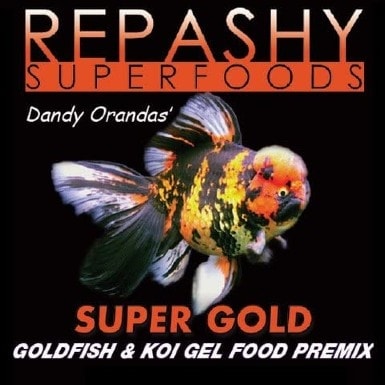



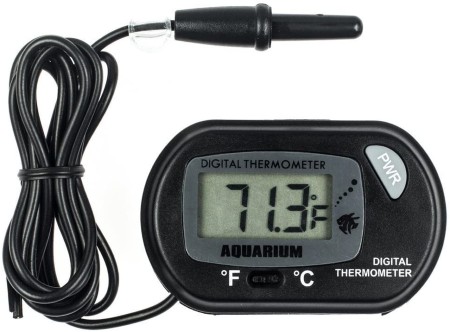













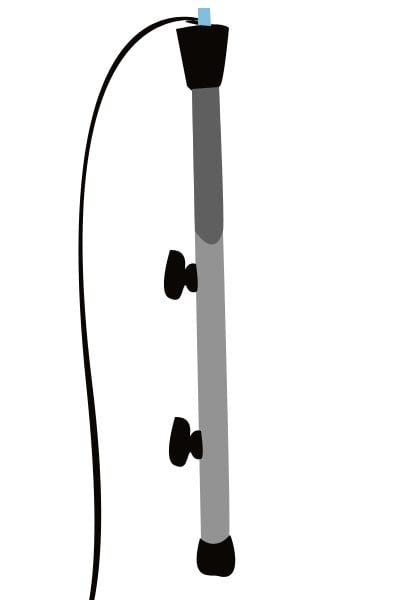
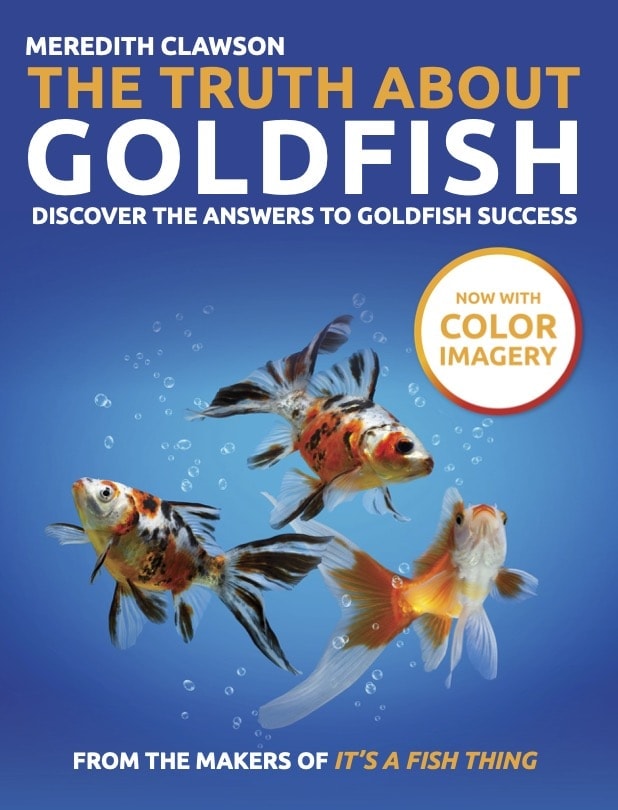




































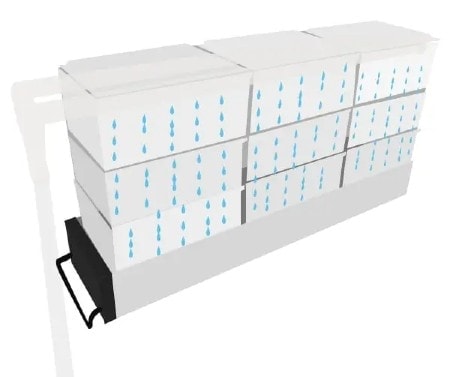











 Aquarium Accessories
Aquarium Accessories








